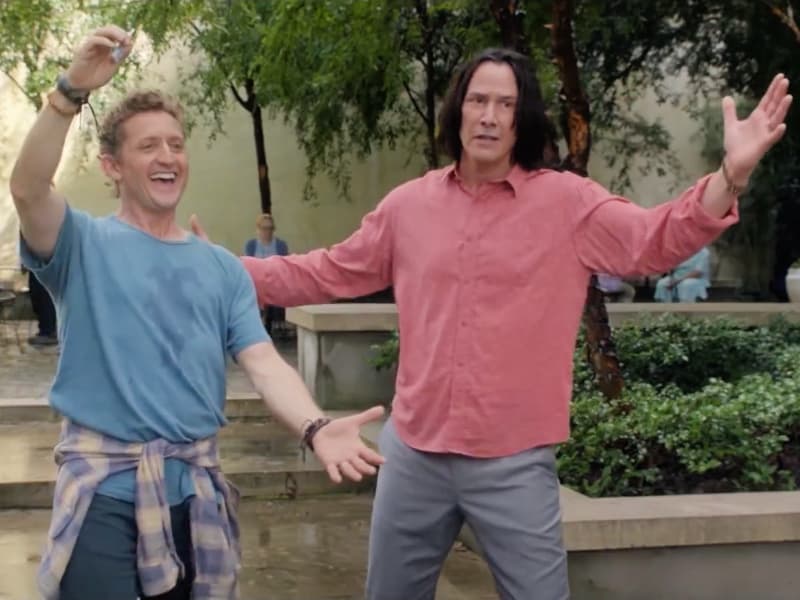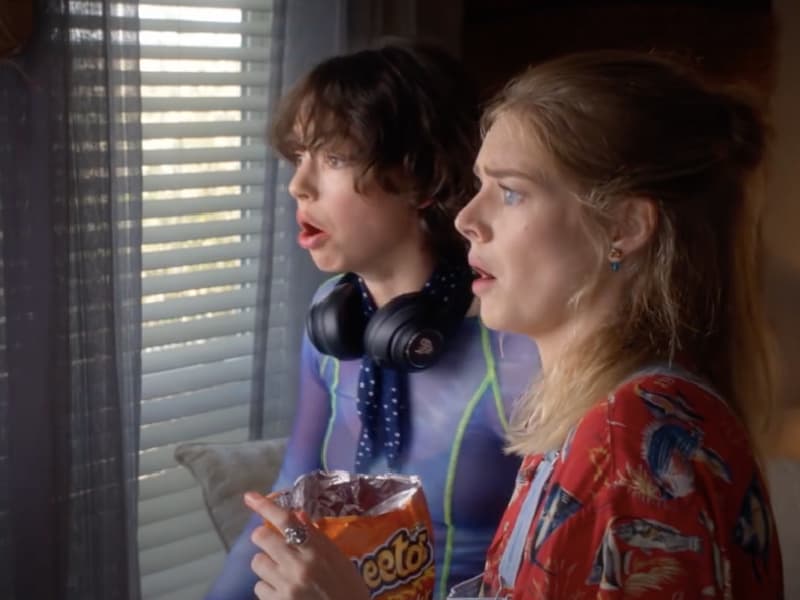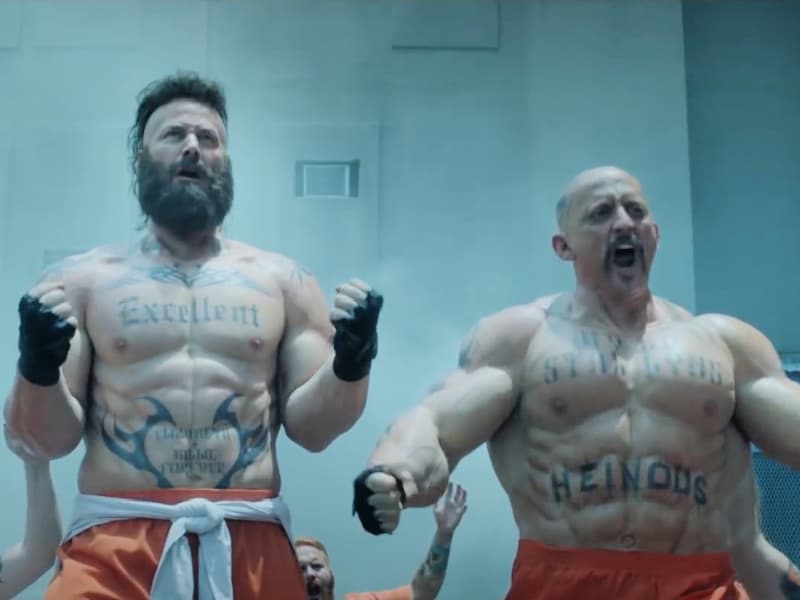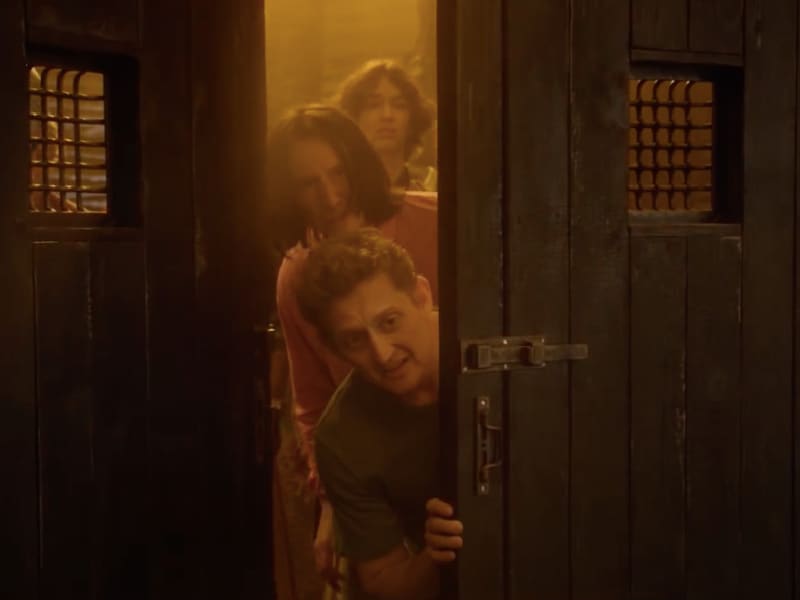Welcome to World Builders, our ongoing series of conversations with the most productive and thoughtful creatives in the industry. In this entry, we interview director Dean Parisot, screenwriters Ed Solomon and Chris Matheson, and hear a little from Keanu Reeves and Alex Winter about the blessed, delusional optimism of Bill and Ted Face the Music.
Be excellent to each other. Party on dudes. You can have one without the other, but their might is mightier when paired together.
A most excellent ampersand should link the two philosophies, and within that bond are two bodacious champions of positivity. Thirty-one years after their first appearance, we need Bill & Ted more than ever. The world outside our windows appears pretty grim. To survive it requires an impossible zeal.
For decades, the chances of Bill & Ted Face the Music coming together seemed unlikely. Rumors swirled for years. Hopes rose and fell. If not for the intense dedication of its stars, its screenwriters, and its fans, the third film would have never materialized.
Ed Solomon and Chris Matheson first developed Bill & Ted as part of an improv session, inhabiting the best buds who punctuate every emotion with a “whoa” or “excellent.” They couldn’t shake the characters, eventually developing them into 1989’s Bill & Ted’s Excellent Adventure, where Alex Winter and Keanu Reeves would become their stewards.
“They’re meaningful,” says Matheson. “They’re not our children, obviously, but they feel like our creation and alter egos and imaginary friends. We really like them, and we wanted to do right by them.”
Solomon thought the chances of closing out the trilogy were impossible. Then again, he thought the chances of a second film were impossible. And even the chances of the first film screening theatrically were at one point bleak as well. Bill & Ted always found a way, and once Solomon entered the realm of social media, he discovered the impenetrable passion of the fanbase.
“I felt a responsibility to the fans,” he explains. “To them, the existence of the third Bill & Ted movie seemed to actually matter. Because Bill & Ted meant so much to us, I started to feel this personal responsibility to make it happen. I felt like if we could get this made for them, we would somehow honor them in a weird way. It was their voices who made the financiers ultimately feel like it was worth it.”
As society sinks into a funk, the philosophy of Bill & Ted fortifies. These are incredibly curious creatures failed by teachers beholden to textbooks. When they came face to face with history, their minds were blown by its majesty, and they were able to take its wonder to the streets of San Dimas and into the audience beyond the movie screen.
Bill & Ted are not dumb; they just don’t know what they don’t know. That’s us, dudes!

Director Dean Parisot found faith in his heroes. While their passion for learning endures in Bill &Ted Face the Music, the utopian dream they were promised by Rufus (George Carlin) in the original film failed to realize. When the future comes calling once again, they help for the sake of helping.
“Bill & Ted might be delusionally optimistic,” says Parisot, “but their delusions prove to be correct. We all have things as we get older that we wish we had accomplished that we didn’t. We defined ourselves when we were teenagers, and then we try to live up to that, but happenstance and luck and everything come into play, and you don’t get there.”
Rather than wallow in their bogus ordinariness, the two friends hold on to what they have: each other, their wives, and their daughters. The band is family. The family is the band.
“But the biggest reason for making this movie,” he continues, “beyond loving these characters, loving the franchise and having personal friends involved, is learning that it’s not about the songs, but it is about playing them together. That appeals to me in a time where we’ve gone the other direction in so many ways at this moment in history.”
Being excellent to each other is a practice. With the new film, Winter and Reeves wanted to champion the optimism of their characters, but they also wanted to show the work that went into their fight for excellence. Their purpose has pertinence, and it’s a cause more could adopt.
“I think it’s relevant all the time,” says Reeves. “I guess now, it has more impact just because of the situation that we find ourselves in. The idea of ‘Be excellent to each other,’ I think, is a very good idea.”

Bill & Ted’s warm-hearted openness is a beacon for today and tomorrow. Keeping their torch lit is an honor for the actors. They’re happy that so many are responding positively to it today, but they imagine we would respond well to it no matter when the film came out.
“The Bill & Ted movies have an inherent sweetness,” says Winter. “And they have a theme of inclusivity, of people being kind to each other and coming together. That was certainly the story that Chris Matheson and Ed Solomon set out to write with the third one, many years before there was a COVID or a situation like we’re in today. It just so happens to be something that may bring folks some joy in this particular time.”
Battling banal wickedness is at the center of all three Bill & Ted films. Sure, reality as we know it might tumble into non-existence, but the ultimate stakes rest within the family unit. Before Rufus ever arrived, Bill & Ted were already facing a hellacious future.
“There’s a lot of darkness and pain in their lives,” says Matheson. “We didn’t consciously ever think of it, but that was there. They both have broken homes, no mothers, incredibly cruel, brutal fathers, and nobody except each other when you get down to it.”
However, in the new film, Bill & Ted don’t just have each other. They have their wives and their daughters. Failing themselves and their future would result in failing their family. As children of deadbeat dads and absent moms, the duo understands and fears the heartache of parental defeat better than anyone.
“The psychological ramifications seemed to play out in this movie more,” says Solomon. “Ted is much more conflicted, especially when he goes forward and deals with future versions of himself. He’s very tormented, and that’s something that Chris and I both love about Keanu’s performance. It’s darker, but it’s also got a lightness in it. There are multiple levels to Ted.”

Filling in the gaps between Bill & Ted’s Bogus Journey and Bill & Ted Face the Music was a tremendous appeal for Reeves. Acknowledging the pain at Ted’s core was crucial, and it elevates the awesome power of his optimism. There is strength in good cheer.
“It’s been many years since we’ve seen them last,” says Reeves. “During those years, they’ve lived life, and they’ve got more mature daughters. They’ve been together with this kind of pressure of this destiny. They were given the responsibility of uniting the world through their music that they haven’t been able to do.”
The language and the movements returned quickly to Reeves and Winter, but they couldn’t neglect the doubt that builds within these two after their band Wyld Stallyns withered. Being excellent to each other is made all the more Herculean beneath the shadow of uncertainty.
“What does that look like?” continues Reeves. “We played these guys who are still familiar but not caricatures of themselves. We had to be present so that we felt the weight of these guys, as well as their joy and their lightness and their spirit.”
Directing Bill & Ted Face the Music was like hosting a party for Dean Parisot. He made sure his actors had what they needed, and then he let them do their thing.
“These two guys have known each other their whole life,” says Parisot. “They’ve played these characters in two movies before. We then lived with this film, developing it — for me, it was six or seven years, and for them, it was eleven. Once we got to the set, those guys worked like crazy. You want to create an environment where they can succeed, and they didn’t’ need any help from me.”

The chemistry between Reeves and Winter dictated the visual language of Bill & Ted Face the Music. The gravitational pull between the two actors was too strong to ignore. The movie bent to their will.
“We discovered that Bill & Ted don’t really work very well in singles,” says Parisot. “They’re constantly in a two-shot because they’re constantly working off one another. They’re so talented as physical comedians. It’s not contrived, they’ve just been best friends forever. They’re working off one another all the time that when you’re cutting, you tend to remove yourself from that experience.”
Winter and Reeves are not sad to see Bill & Ted go, because they can’t leave. They’re not going anywhere. Bill & Ted are tied to their beings, and they wouldn’t have it any other way.
“It’s a strange and very lovely thing to have in your life,” says Winter. “You’re in your day, you’re in your head, you’re in your world, which has got nothing to do with public life, and some five-year-old comes running up to you to tell you how much you mean to them. It’s pretty amazing.”
For Reeves, the feeling is mutual. No matter what else he’s done in his career, Bill & Ted remain a cornerstone to his personal and creative life. Nothing gives quite like Bill & Ted.
“It’s such an honor to work with Alex,” says Reeves. “The way that we can share our sense of humor and laugh in the work. That’s something I don’t get anywhere else. It’s pretty extraordinary. I’m very grateful for it.”
Focusing on the negative is a natural gut reaction. It’s easy. Finding excellence in each other demands effort, but if we can uncover the good qualities of others and ourselves, then we can party on. Dudes.
We need you Bill & Ted; you’re our only hope.
Bill & Ted Face the Music opens in select theaters and on VOD on August 28th.
0 comments:
Post a Comment